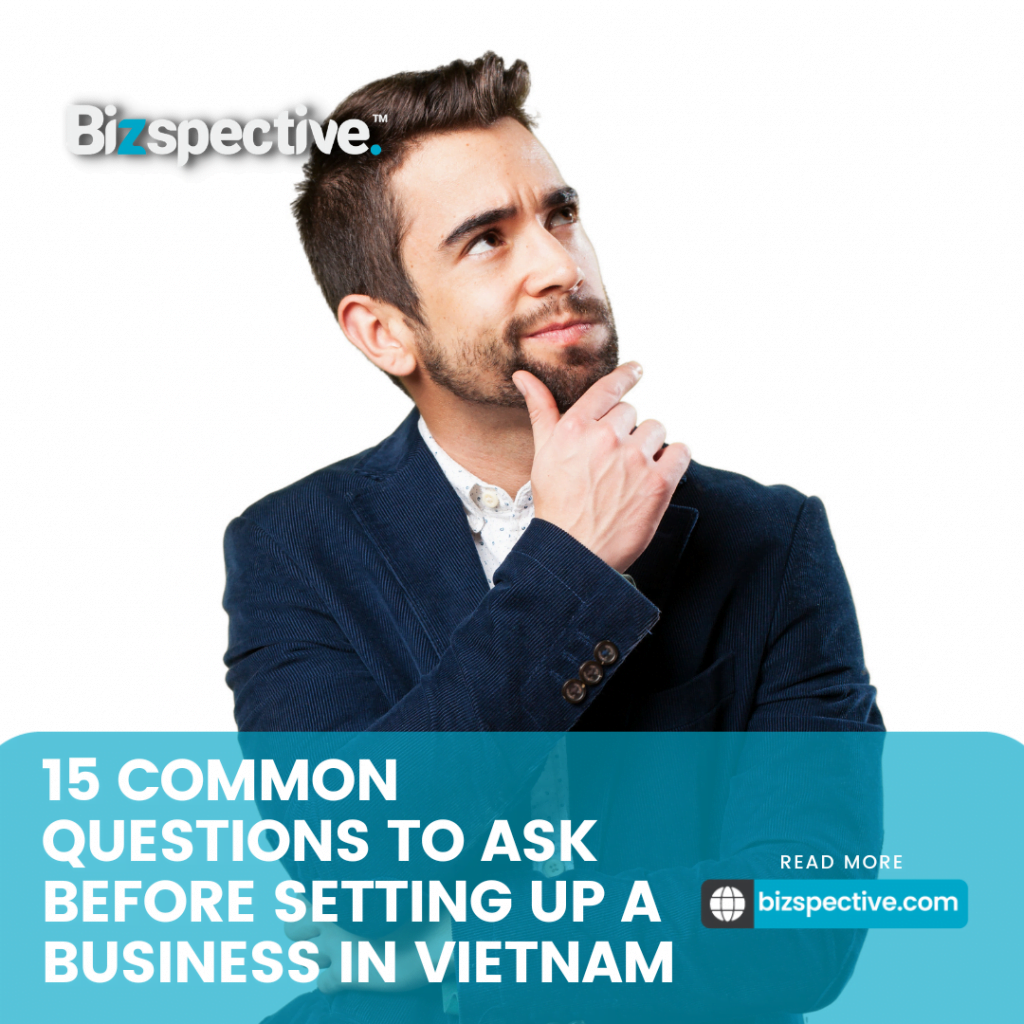Are you looking to open a new business in Vietnam? Here is the list of 15 questions you should know the answers to before setting up a business here as a foreigner.
These questions cover a wide range of topics, from the business set-up process to legal matters. By answering these questions, you can better understand the challenges and opportunities of doing business in Vietnam.
Table of Contents
Business set-up
-
Develop a business plan and investment strategy.
-
Conduct market research and draft financial forecasts to assess viability (find out the size of the market, profitability, etc).
-
Consult with 2-3 lawyers or service providers and compare their advice. Bizspective’s experts have extensive knowledge and years of experience in the field of setting up businesses in Vietnam. They can provide valuable advice and guidance tailored to your specific needs. Feel free to reach out to them here.
-
Learn the basic requirements for opening a business in Vietnam (capital, location, etc), and decide on the best options.
-
Choose a suitable service provider to assist you.
-
Begin the process of registering a business in Vietnam legally. Please note that all of the steps listed below will be carried out by your start-up service provider:
-
Preparation: Decide on a suitable business structure, business line, ownership structure, capital level, and location for your new business in Vietnam.
-
Register for an IRC and ERC.
-
Post-registration: publish your new business, obtain a company seal, register with tax authorities, open a bank account, obtain sub-licenses, etc.
-
For more information: How to register a business in Vietnam
Setting up a company in Vietnam and obtaining an IRC and ERC usually takes 3 to 7 weeks. This timeline also depends on the location of your new business in Vietnam. However, the time will be longer if your business line requires additional licenses.

Each option has its own advantages and disadvantages. Learn more about this through our blog: Why you should not open a business in Vietnam and The pros and cons of setting up a business in Vietnam.
Vietnam’s main types of business include limited liability companies (LLC), joint stock companies (JSC), partnerships, and private enterprises. Other forms are Representative office, joint venture, and public-private partnership.
Having a Vietnamese partner to set up a business in Vietnam is not always compulsory.
Some conditional business lines require a Vietnamese partner. For example, operating a travel and marketing agency in Vietnam requires a Vietnamese partner. In such cases, foreign investors must partner with local individuals or entities to meet regulatory requirements.
It’s important to carefully review the regulations and guidelines the Vietnamese government sets regarding foreign investment and ownership in specific industries before starting a business in Vietnam.

Accounting and tax
-
The general business tax timeline in Vietnam is as follows:
-
Monthly filing: The 20th of the following month.
-
Quarterly filing: The last date of the first month of the following quarter.
-
Yearly filing: The 31st March of the following year.
-
-
Please note that the business tax timeline in Vietnam does not have extension filing.
For more information: Business Tax Timeline In Vietnam
-
Value Added Tax (VAT): VAT is a consumption tax imposed on the sale of goods and services in Vietnam. The standard VAT rate is 10%, but there are also 5% and 0% reduced rates for specific goods and services. Businesses are generally required to register for VAT and collect it from their customers on behalf of the tax authorities.
-
Corporate Income Tax (CIT): This is a tax levied on the profits earned by businesses in Vietnam. The current standard corporate income tax rate is 20%, but it could be higher for businesses in the natural resources field and lower for incentivized business areas.
-
Personal Income Tax (PIT): Personal income tax applies to individuals who earn income from employment, business activities, or other sources in Vietnam.
-
Foreign Contractor Tax (FCT): This tax is imposed on foreign companies and individuals making money from Vietnam on the basis of a contract with a Vietnamese-based company.
-
Other tax: capital assignment tax, special sales tax, property tax, import and export duties, etc.
For more information: Corporate taxes in Vietnam

Vietnam has its own accounting standards, which are called Vietnamese Accounting Standards (VAS). These standards are issued by the Ministry of Finance and are applicable to all entities operating in Vietnam, including both domestic and foreign-invested companies.
Vietnamese Accounting Standards (VAS) are based on the International Financial Reporting Standards (IFRS), but the two have notable differences.
For more information: Vietnam accounting standard for business owners
Legal
Under the Vietnamese Law on Investment of 2020, many investment incentives are available in Vietnam. These incentives aim to promote economic development, encourage investment in certain industries or regions, and enhance the competitiveness of businesses in Vietnam.
Types of investment incentives in Vietnam are:
-
Corporate income tax incentives
-
Exemption from import tax
-
Exemption from and reduction of land levies and land rent
-
Accelerated depreciation
Eligible entities for investment incentives in Vietnam are:
-
Both local and foreign-owned businesses in Vietnam
-
Investment projects that have certain business lines registered
-
Investment projects that are located in certain geographical areas
-
Investment projects with a capital of VND 6,000 billion (~USD 265 million) or more
-
Social housing construction projects
-
Hi-tech projects
-
Start-up projects, National innovation centers and research & development centers
-
SME supporting projects.
For more information: Investment incentives in Vietnam

-
Requirements for business compliance in Vietnam include:
-
Registering for tax
-
Issuing VAT invoices
-
Obtaining a business license tax certificate
-
Contributing Capital
-
-
Non-compliance with tax obligations can lead to significant penalties for your business in Vietnam. Failure to submit records or make timely tax and insurance payments can result in fines, calculated based on the number of days of delay.
For more information: Business compliance in Vietnam
-
IRC: In Vietnam, an Investment Registration Certificate (IRC) is a certificate issued by the Department of Planning and Investment that documents the information of an investor and their investment project. It can be in the form of a physical or digital certificate.
-
ERC: The Enterprise Registration Certificate (ERC) is a mandatory legal document required for establishing a business in Vietnam. It is issued by the Business Registration Office, which operates under each province or city’s Department of Planning and Investment.
For more information: Investment Registration Certificate in Vietnam, Enterprise Registration Certificate in Vietnam

Finance
-
Market research costs
-
Legal costs
-
Investment certificate and enterprise certificate costs
-
Additional license costs
-
Charter capital
-
Post-certification process
For more information: What are the costs of starting a business in Vietnam?
-
Fixed operational costs for a business in Vietnam
-
Rental fees
-
Internet, electricity, and water fees
-
Labor costs in Vietnam
-
-
Variable operational costs (like material costs or commission costs, depending on your business line)
For more information: Costs of running a business in Vietnam

Visa
A Vietnam investor visa, officially known as the Investor Visa (ĐT visa), is a visa issued to foreign investors who contribute capital to businesses in Vietnam. This visa category is designed to attract foreign investment and promote economic development in the country.
Types of investor visas in Vietnam: ĐT1, ĐT2, ĐT3, ĐT4.
For more information: What you need to know about the Vietnam investor visa
Yes, as an investor in Vietnam, you can acquire a Temporary Residence Card (TRC) to legally reside in the country for an extended period. However, it only applied to visa holders of ĐT1 (up to 10 years), ĐT2 (up to 5 years), and ĐT3 (up to 3 years).
